
Boehringer Ingelheim could soon stake a claim in the lucrative obesity treatment market after the pharma company said it has advanced a candidate into three Phase III trials following promising data.
Survodutide, the company’s glucagon/glucagon-like peptide 1 (GLP-1) receptor dual agonist co-developed with Zealand Pharma, demonstrated up to 19% weight loss after 46 weeks of treatment in a Phase II dose escalation trial investigating the drug in patients living with obesity without type 2 diabetes (T2D).
In a statement announcing the plans, Boehringer Ingelheim said that insights from previous studies will be used to inform the design of the three Phase III trials which will investigate the efficacy and safety of survodutide. Enrolment of patients is planned before the end of 2023, with the company saying that study details will be unveiled nearer to trial commencement.
Survodutide has previously received a US Food and Drug Administration (FDA) fast track designation for its use as a treatment for adults with or without T2D who have liver fibrosis and non-alcoholic steatohepatitis (NASH). It will now go up against rival GLP-1 agonists in the weight loss treatment space. Novo Nordisk’s blockbuster drug Wegovy (a subcutaneous formulation of its approved diabetes drug semaglutide) dominates the market, but Eli Lilly is mounting fierce competition with its first-in-class therapy retatrutide – a drug that offers triple-agonist (triple-G) mechanism of action. Last month, the company unveiled record-breaking weight loss data for the drug.
Novo Nordisk’s stranglehold of the weight loss market has been weakened by supply issues, with the company having to limit doses as demand continues to exceed manufacturing capabilities. This leaves avenues open for drugs emerging out of late-stage trials to enter the market, which GlobalData has forecasted to reach $37.1bn by 2031. The model does, however, predict Wegovy maintaining its tag as the top-selling drug in the treatment space.
Boehringer Ingelheim’s candidate stands out from other obesity drugs in that it also targets the hormone glucagon. It remains to be seen from the planned Phase III trials whether this dual agonism approach produces more efficacious results compared to GLP-1 receptor mono-agonists.
Boehringer Ingelheim human pharma head Carinne Brouillon said: “We are continuing to expand and accelerate our portfolio in this area with the aim of bringing survodutide to patients in need as quickly as possible.
“There is a significant unmet medical need for effective treatments for obesity. With its dual mode of action, survodutide has the potential to further improve outcomes for people living with the disease and its associated complications.”
